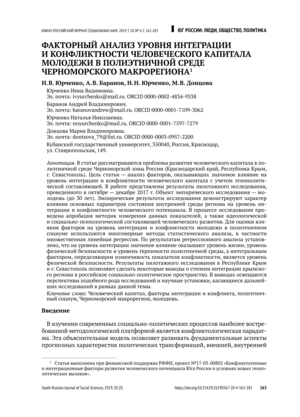Аннотация
В статье рассматриваются проблемы развития человеческого капитала в полиэтничной среде Черноморской зоны России (Краснодарский край, Республика Крым, г. Севастополь). Цель статьи — анализ факторов, оказывающих значимое влияние на уровень интеграции и конфликтности человеческого капитала с учетом этнополитической составляющей. В работе представлены результаты пилотажного исследования, проведенного в октябре — декабре 2017 г. Объект эмпирического исследования — молодежь (до 30 лет). Эмпирические результаты исследования демонстрируют характер влияния основных параметров состояния внутренней среды региона на уровень интеграции и конфликтности человеческого потенциала. В процессе исследования проведена апробация методик измерения данных показателей, а также идеологической и социально-психологической составляющей человеческого развития. Для оценки влияния факторов на уровень интеграции и конфликтности молодежи в полиэтничном социуме используются многомерные методы статистического анализа, в частности множественная линейная регрессия. По результатам регрессионного анализа установлено, что на уровень интеграции значимое влияние оказывают уровень жизни, уровень физической безопасности и уровень терпимости полиэтничной среды, а интегральным фактором, определяющим изменчивость показателя конфликтности, является уровень физической безопасности. Результаты пилотажного исследования в Республике Крым и г. Севастополь позволяют сделать некоторые выводы о степени интеграции крымского региона в российское социально-политическое пространство. В выводах освещаются перспективы подобного рода исследований и научные установки, касающиеся дальнейших исследований в рамках данной темы.
Ключевые слова
Информация о финансировании
Статья выполнена при финансовой поддержке РФФИ, проект №17-03-00802 «Конфликтогенные и интеграционные факторы развития человеческого потенциала Юга России в условиях новых геополитических вызовов».
Библиографические ссылки
Alexander, J. C. (1992). Democracy and Civil Society. Mimeo, Los Angeles: UCLA.
Baranov, A. V., Dontsova, M. V., Chigrin, V. A. (2017). Mezhetnicheskiye otnosheniya v Krasnodarskom kraye i Respublike Krym v zerkale obshchestvennogo mneniya molodezhi: sravnitel'nyy analiz [Ethnic Relations in The Krasnodar Territory and the Republic of Crimea in The Reflection of The Youth Public Opinion: A Comparative Analysis]. Obshchestvo: sotsiologiya, psikhologiya, pedagogika [Society: Sociology, Psychology, Pedagogics], 11, 10–14.
Bychenko, D. Yu. (2011). Metodologicheskiye osnovy issledovaniya chelovecheskogo potentsiala [Methodological Bases of Human Potential Research]. Izvestiya Saratovskogo universiteta. Seriya: Sotsiologiya, politologiya [Izvestia of Saratov University. New Series. Series: Sociology. Politology], 11(2), 56–59
Castells, M. (1997). The Power of Identity, The Information Age: Economy, Society and Culture. Cambridge; Oxford: Blackwel.
Korchagina, I. I. (2012). Izmereniye chelovecheskogo potentsiala v usloviyakh ogranicheniya dostupa k resursam yego razvitiya [Measurement of Human Potential in Conditions of Limited Access to Its Development Resources]. Zhurnal institutsional'nykh issledovaniy [Institutional Studies Journal], 4(1), 68–78.
Kozer, L. A. (2000). Funktsii sotsial'nogo konflikta [Functions of Social Conflict]. M: Ideya-Press.
Kriesberg, L. (2009). Waging Conflicts Constructively. In by S. Byrne, D. Sandole, I. Staroste-Sandole, J. Senehi (Eds.) Handbook of Conflict Analysis and Resolution (pp. 157–169). N.Y.: Routledge; Francis and Taylor Group.
Kriesberg, L. (2015). A Constructive Conflict Approach to World Struggles. The Brown Journal of World Affairs, 21(2), 24–37.
Kriesberg, L. (2015). Realizing Peace: A Constructive Conflict Approach. N.Y.: Oxford University Press.
Lipset, S. (2016). Politicheskiy chelovek: sotsial'nyye osnovaniya politiki [Political Man: The Social Bases of Politics]. M.: Mysl'.
Machlup, F. (1984). The Economics of Information and Human Capital. Princeton: Princeton University Press.
O’Loughlin, J., Toal, G. (2019). The Crimea Conundrum: Legitimacy and Public Opinion after Annexation. Eurasian Geography and Economics, 60(1),6–7. DOI: 10.1080/15387216.2019.1593873.
Pastor, M. Jr., Dreier, P., Grigsby, J. E & Lopez-Garza, M. (2000). Regions That Work. How Cities and Suburbs Can Grow Together. Minneapolis: Univ. of Minnesota Press.
Social Integration: Approaches and Issues. (1994) UNRISD Briefing Paper No. 1. World Summit for Social Development. N.Y.: United Nations Research Institute for Social Development. Retrieved from http://www.unrisd.org/80256B3C005BCCF9/ (httpAuxPages)/510920DA18B35A6880256B65004C6A7B/$file/bp1.pdf
Surinov, A. Ye. (2015). Itogi perepisi naseleniya v Krymskom federal'nom okruge [Census Results in the Crimean Federal District] (pp. 135–141). M.: IITS “Statistika Rossii”.
Tishkov, V. A. (2013). Rossiyskiy narod. Istoriya i smysl natsional'nogo samosoznaniya [Russian People. The History and Meaning of National Consciousness]. M.: Nauka.
Van Dijk, T. A. (2008). Discourse and Power: Representation of Domination in Language and Communication. Houndmills; Basingstoke: Palgrave Publ.
Yurchenko, I. V. (2013). O nekotorykh faktorakh rasprostraneniya ideologii ekstremizma v politiko-informatsionnom prostranstve [On some Factors of Spreading the Ideology of Extremism in the Political and Information Space]. Vestnik Adygeyskogo gosudarstvennogo universiteta [The Bulletin of Adyghe State University: Internet Scientific Journal], 2(118), 251–256
Yurchenko, I. V. (2015). Radikalizatsiya politicheskogo soznaniya v usloviyakh krizisa i tekhnologii protivodeystviya ekstremizmu [The Radicalization of Political Consciousness in a Crisis and Technology to Counter Extremism]. In Konflikt kak problema. Ocherki sovremennoy teoreticheskoy i prikladnoy konfliktologii [Conflict as a Problem. Essays on Contemporary Theoretical and Applied Conflictology] (pp. 384–399). SPb: SPbGU, Fond razvitiya konfliktologii.
Yurchenko, N. N. (2013). Konstruktivnyy potentsial sotsial'nogo proyektirovaniya v usloviyakh radikalizatsii politiko-informatsionnogo prostranstva [Constructive Potential of Social Design in Conditions of Radicalization of Political and Information Space]. Yevropeyskiy zhurnal sotsial'nykh nauk [European Journal of Social Sciences], 9, 134–147.
Zavershinskiy, K. F. (2015). Politiko-kul'turnyye izmereniya sotsial'nykh konfliktov [Political and Cultural Dimensions of Social Conflicts]. In A. I. Strebkov, A. V. Aleynikov, A. G. Pinkevich (Eds.) Konflikt kak problema. Ocherki sovremennoy teoreticheskoy i prikladnoy konfliktologii [Conflict as a Problem. Essays on Modern Theoretical and Applied Conflictology]. SPb.: Fond razvitiya konfliktologii.
Zaznayev, O. I. (2011). Politicheskaya identichnost' i politika identichnosti: Ocherki [Political Identity and Identity Politics: Essays]. Kazan': Otechestvo.


